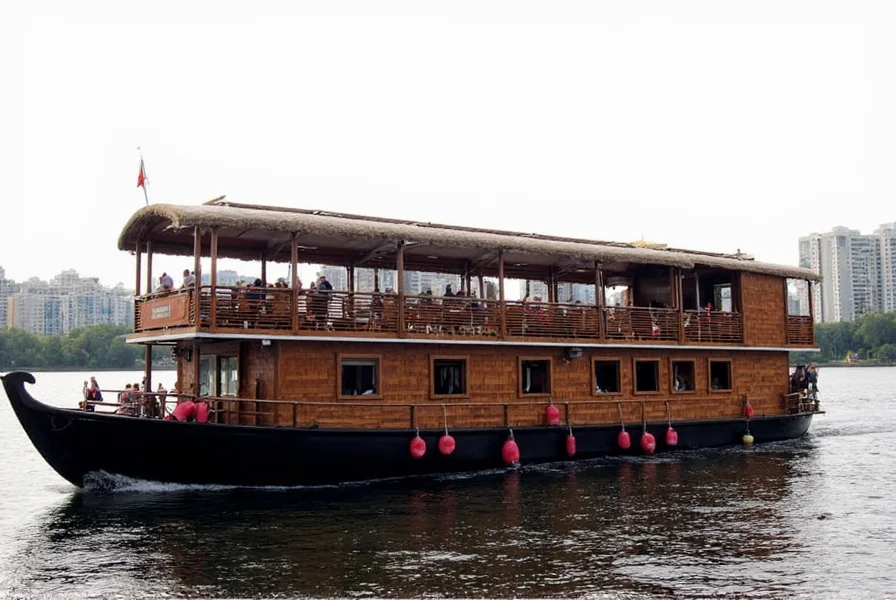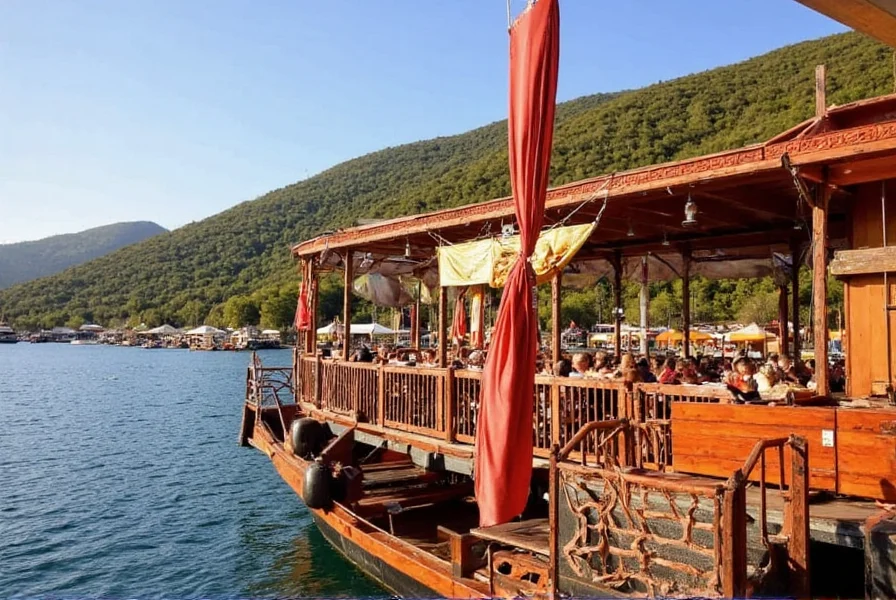Ginger Boat represents more than just a meal—it's a cultural immersion into Asia's rich maritime culinary traditions. These floating restaurants transform ordinary dining into an extraordinary experience where the gentle rocking of the water complements the bold flavors of ginger-infused dishes. Unlike standard waterfront dining, Ginger Boat establishments operate directly on the water, often in harbors or along rivers, maintaining a centuries-old tradition of水上餐饮 that dates back to fishing communities who prepared fresh catches aboard their vessels.
Origins of the Floating Restaurant Tradition
The concept of水上 restaurants emerged from China's coastal communities where fishermen would prepare their daily catch right on their boats. This practice evolved into commercial floating eateries during the 19th century, particularly in Guangdong province. The "Ginger Boat" variation specifically developed as chefs recognized ginger's dual role as both a flavor enhancer and seasickness remedy for diners experiencing gentle waves.
Historical records show that by the early 20th century, these floating restaurants had become cultural landmarks in Hong Kong's Aberdeen Harbor, often called "restaurant boats" or chuen teng in Cantonese. The ginger-focused iteration gained popularity in the 1980s when chefs began emphasizing ginger's digestive properties and warming qualities, making the dining experience more comfortable for guests on the water.
What Makes Ginger Boat Cuisine Unique
The culinary approach aboard Ginger Boat establishments distinguishes them from standard Chinese restaurants. Chefs utilize multiple ginger varieties—fresh young ginger, preserved ginger, and dried ginger—each contributing different flavor profiles to dishes. This multi-dimensional ginger usage creates a signature taste experience that has become synonymous with the Ginger Boat concept.
| Ginger Type | Usage in Ginger Boat Cuisine | Signature Dishes |
|---|---|---|
| Fresh Young Ginger | Thinly sliced for delicate flavor | Ginger-steamed fish, Ginger chicken |
| Preserved Ginger | Balances rich flavors | Braised pork belly, Seafood hot pot |
| Dried Ginger | Medicinal preparations and teas | Ginger tea, Ginger-infused rice wine |
Professional chefs at reputable Ginger Boat establishments follow precise techniques for ginger preparation. They peel young ginger with bamboo scrapers to preserve essential oils, slice it paper-thin using specialized knives, and often blanch it briefly to reduce sharpness while maintaining aromatic qualities. This attention to detail transforms ordinary ingredients into extraordinary dishes that define the Ginger Boat dining experience.
Experiencing a Ginger Boat Restaurant
Visiting a Ginger Boat isn't merely about the food—it's a multisensory journey. The experience typically begins with a short boat transfer from shore to the floating restaurant, immediately separating diners from urban distractions. Traditional establishments maintain wooden decks with simple seating, while modern interpretations might feature climate-controlled interiors with panoramic windows.
Authentic Ginger Boat restaurants follow specific service protocols developed over decades. Servers often explain the different ginger preparations used in various dishes and may offer ginger-infused welcome drinks to prepare palates. The gentle movement of the boat creates a naturally relaxed atmosphere that enhances the dining experience, with many patrons reporting that food tastes noticeably different—and often better—when consumed on the water.

Locations and Cultural Significance
While Hong Kong remains the epicenter of the Ginger Boat phenomenon, similar concepts have emerged in Thailand's Chao Phraya River, Vietnam's Halong Bay, and Malaysia's Penang. Each region adapts the concept to local culinary traditions while maintaining the core elements of水上 dining and ginger-focused cuisine.
In Chinese culture, ginger symbolizes warmth, protection, and good health—qualities that perfectly complement the maritime environment. Traditional beliefs hold that ginger wards off negative energy from the water, making it culturally appropriate for boat-based dining. This cultural resonance explains why the Ginger Boat concept has endured while other floating restaurant trends have come and gone.
Planning Your Ginger Boat Experience
For those seeking an authentic Ginger Boat experience, certain considerations ensure maximum enjoyment. Morning visits often provide the calmest waters and freshest seafood deliveries. Look for establishments where chefs prepare dishes in open kitchens aboard the boat, ensuring ingredients never leave the水上 environment. Many experienced visitors recommend booking tables on the upper deck for better ventilation and views.
Seasonal variations significantly impact the Ginger Boat experience. During cooler months, restaurants emphasize warming ginger preparations, while summer menus feature lighter ginger applications that refresh rather than heat. The lunar calendar also influences offerings, with special menus during Chinese New Year featuring symbolic ginger preparations believed to bring prosperity.
Preserving the Ginger Boat Tradition
Modern challenges including urban development and changing dining preferences have threatened traditional Ginger Boat establishments. However, cultural preservation efforts in Hong Kong and elsewhere have helped maintain this unique culinary heritage. Some operators now combine heritage with innovation, using sustainable practices while preserving traditional cooking methods.
The most authentic Ginger Boat experiences remain those operated by multi-generational families who've maintained recipes and techniques passed down through decades. These establishments represent living culinary history where every dish tells a story of maritime tradition and ginger's enduring role in Asian cuisine.
What exactly is a Ginger Boat restaurant?
A Ginger Boat restaurant is a floating dining establishment, primarily found in Asian coastal regions, that specializes in Chinese cuisine featuring ginger prominently in its dishes. These restaurants operate on boats permanently moored in harbors or along rivers, offering diners a unique水上 culinary experience where traditional ginger preparations complement the maritime environment.
Where can I experience an authentic Ginger Boat restaurant?
The most authentic Ginger Boat experiences are found in Hong Kong's Aberdeen Harbor, though similar concepts exist in Thailand's Chao Phraya River, Vietnam's Halong Bay, and Malaysia's Penang. Traditional establishments have operated in Hong Kong for over 70 years, with some family-run operations maintaining the same recipes and techniques across multiple generations.
Why is ginger so important in Ginger Boat cuisine?
Ginger serves multiple purposes in Ginger Boat cuisine: it enhances flavor profiles, aids digestion during seafood consumption, and helps prevent seasickness from the gentle rocking of the boat. Chefs use different ginger varieties—fresh young ginger for delicate dishes, preserved ginger for richer preparations, and dried ginger for medicinal teas—creating a multi-dimensional culinary experience that defines the Ginger Boat concept.
What should I expect when dining at a Ginger Boat restaurant?
Dining at a Ginger Boat involves a complete sensory experience: a short boat transfer to reach the restaurant, traditional Chinese decor with nautical elements, and dishes prepared using time-honored techniques. Expect multiple ginger preparations throughout the meal, from ginger-infused welcome drinks to ginger-steamed seafood. The gentle movement of the water creates a naturally relaxed atmosphere that enhances the dining experience, with many patrons noting that food tastes different when consumed on the water.
Are Ginger Boat restaurants suitable for all seasons?
Yes, Ginger Boat restaurants adapt their offerings seasonally. During cooler months, they emphasize warming ginger preparations that provide comfort against the maritime chill. In summer, menus feature lighter ginger applications that refresh rather than heat. Many establishments have both open-air and climate-controlled seating options, making the experience enjoyable year-round. The lunar calendar also influences seasonal menus, with special ginger preparations during traditional festivals like Chinese New Year.











 浙公网安备
33010002000092号
浙公网安备
33010002000092号 浙B2-20120091-4
浙B2-20120091-4